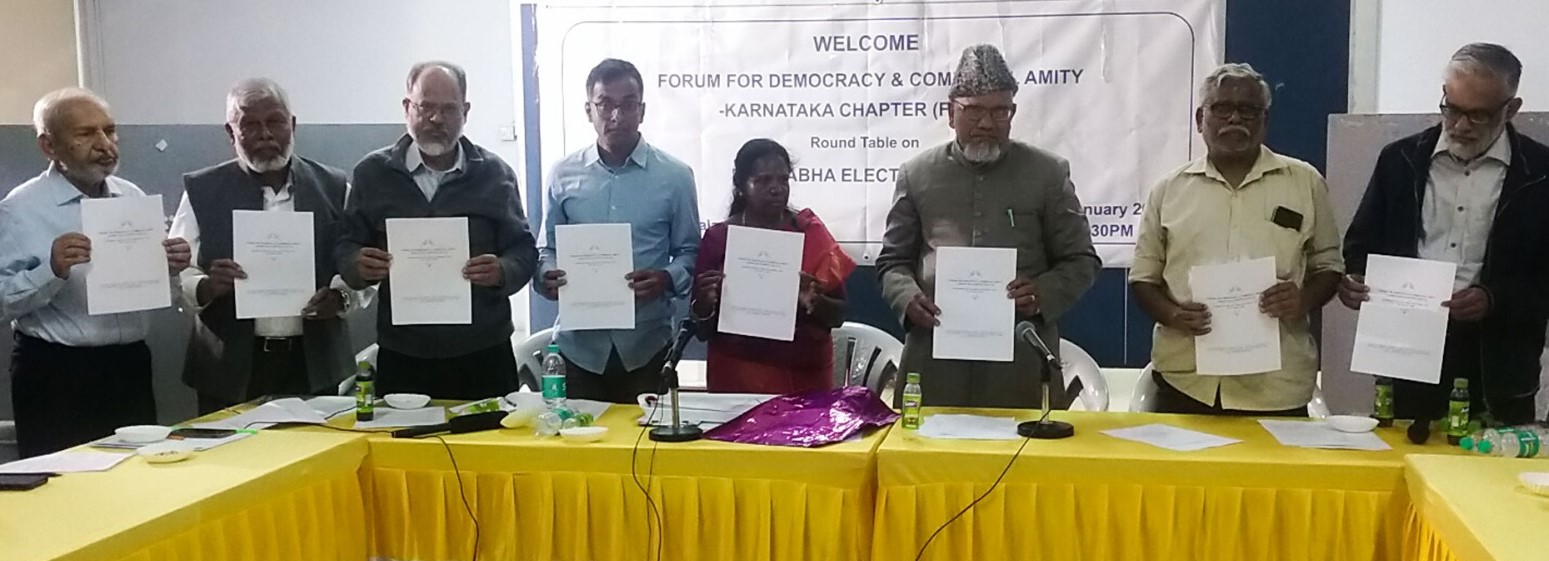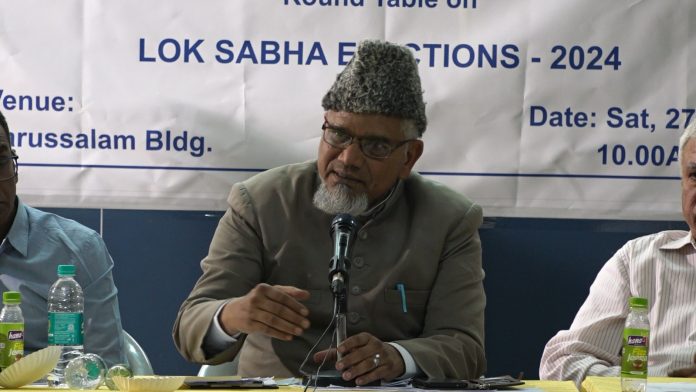– Mohammed Atherulla Shariff
Bengaluru, Jan. 27: Undoubtedly as a nation we have big challenges ahead and a lot of apprehensions have engulfed us, but we can overcome them definitely, said Mohammed Salim Engineer, Vice President of Jamaat-e-Islami Hind here Saturday.
Giving his presidential remarks over a roundtable discussion organized by Karnataka chapter of Forum for Democracy and Communal Amity, on Lok Sabha Elections – 2024, Engineer Salim reminded the gathering that the first War of Independence in 1857 and later the 90 long years struggle for ultimate independence were more herculean in nature than the present challenges. We fought these battles unitedly and upholding our religious beliefs and identities. Our enemy was a super power of the time in whose borders the sun never used to set.
Emphasising his point, Engineer Salim said what we have today is not an enemy but our own people who are completely misguided and not in big numbers. Their ideology of cultural nationalism laced with religion now, is fascist in nature. Fascism is based on lies, false enemy and divisive mentality. It creates fear among its followers against the self-created enemy. These are very weak bases. These are long-term issues which can be tackled.
Mr. Salim said the immediate issue before us is the forthcoming parliamentary elections. The Karnataka experience of assembly elections is a model for us. The fascist forces can be uprooted if people are educated properly by the civil society groups. We should increase our outreach.
He stressfully urged that people need to be educated to vote in an unbiased mode for the betterment of society. He lamented how a man who was a ‘kar sevak’ in the beginning, became a ‘shasak’, and now a ‘samrat’ and further striving to become a god himself.
Participating in the discussion earlier, Mr. Shivsundar, a senior journalist, pointed out five impacts on Constitutional values in the given Indian situation: ‘Adani’isation of the economy; ‘Modi’-fication of Politics; ‘Arnab’isation of media; ‘Ayodhya’fication of the judiciary; and ‘Ram’-ification of the Rashtra. He stressed the need to involve youth by rationally engaging with them on the true issues before the country.
Mr. Arvind Narrain, President of PUCL-K, lamented that Jan 22nd had become a day of disappointment, pain and anguish. SC’s role was also biased in the case of the Ayodhya dispute. He also spoke about how the sedition law has been strengthened to act against expression of disagreement with the government. He also stated that India is moving from ‘Constitutional Raj’ to ‘Rama Raj’.
Ms. Brinda Adige, Founder-Director, Global Concerns India, stated that though women are neither a minority nor weak, however, under the patriarchal society, women’s strength is controlled by patriarchal power. Though women’s participation in electoral politics today is around 14-15%, it is merely used as the “token face” by selecting women as proxies of men wielding political power under the quota system. When women do get the chance of exerting their power and play their role as under the 73rd and 74th Constitutional Amendments, they have effectively and efficiently done their job and focussed on education and health.
“Muslim leaders in the country need to make two bold statements: that they respect Hinduism and that they are not interested in conversion. This will pull the rug from under the feet of those creating a sense of victimhood among Hindus to consolidate Hindu votes in their favour,” said Mr. Trilochan Sastry, Founder-Trustee of Association for Democratic Reforms.
Dr. Mohammad Saad Belgami, JIH State president, pointed out that around 40% of the people’s votes are getting wasted as 10% voters don’t have voter id, 10% don’t bother to vote, 10% voters are unable to reach their voting booth, and 10% voters sell their votes. He stressed the need to develop a movement to establish ‘dharma’ which is empathetic with courage, commitment, concern and sacrifice for next few decades.
Dr. Mohammed Taha Mateen, Director, Acura Hospital, Koramangala, moderated the panel. Mr. M. F. Pasha, IPS (Retd.), General Secretary, FDCA, in his introductory remarks, stated that new laws targeting the minority communities are made without having any consultation and public dialogue. There is currently a challenge to equality, humane morality, and love that is expressed in the Constitution.
 A twenty-point people’s manifesto was released on the occasion.
A twenty-point people’s manifesto was released on the occasion.




